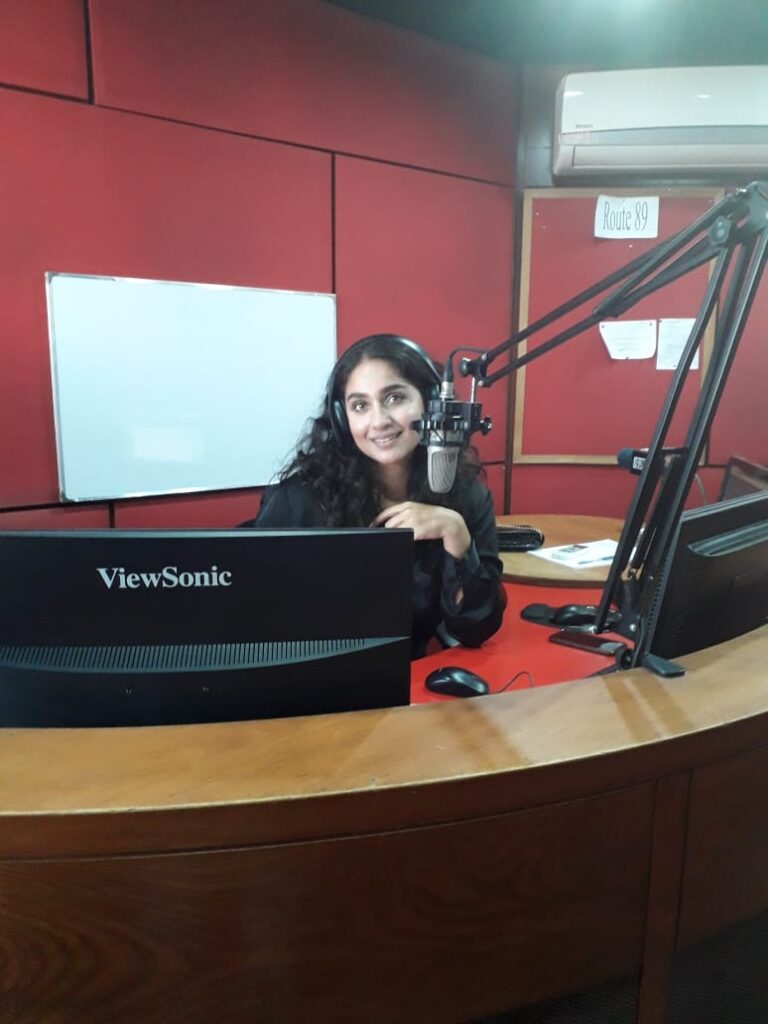Laughter is the best medicine and Sabah Bano Malik is proof of that, says Anmol Irfan
Q: I think most of your followers know that you lived in the US before moving to Pakistan, tell us a little bit about the impact that transition had on you
Sabah: Being a Pakistani American, the only vacation we had was after saving up for a few years and coming to Pakistan. It’s so crazy to think there was no wifi or smartphones in the 80s and 90s, so when you left Pakistan, you didn’t know when you’d get to see each other again.
For my parents, they were coming back to their family and when we came, there was a lot of sitting in people’s houses, so while I went back and forth between the two countries, I didn’t get to see a lot. I also spent two school years here, so I thought it would be less drastic to move back.
But when we moved ten years ago, I found a shocking comparison between Pakistan in 2001, between when I had first lived here and what I was coming to in 2013. The first two years were very hard. Ten years in now it’s definitely home but that transition was really like having water thrown in my face. I realized that the romanticized version expat Pakistanis hold on to isn’t real, there’s very real problems that need to be fixed beyond making a donation and not every Pakistani girl lives my life.
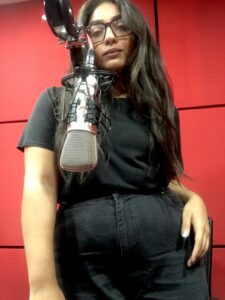
Q: You wear a lot of hats, but what aspect of your work is the truest essence of ‘Sabahbano’, what feels most like you?
S: Truthfully, when I get the opportunity to talk to someone. Whether that’s interviewing someone on my radio show, or hosting an event or moderating a panel, when I am given command of a room, these are the moments I love the most. Even when I’m posting an Instagram story, I feel the same because that’s me inviting you guys to talk to me. The second is the content I do, making people laugh. If you know me in real life, I’m very similar. I want us to talk about our trauma and laugh about it.
Q: What drew you to content creating amidst the other things you do?
S: I grew up in the age when Youtube popped off and I never thought ‘This is what I want to do’. I was so close minded about work and what a Pakistani does. I’d always loved writing but left that as well. But when I came here and got into journalism, I arrived at the time of the death of print media and the move to digital and then that move to social media, so I decided to just go for it.
It wasn’t me sitting there and thinking ‘oh I’ll make content.’ I’m still figuring it out to be honest with you. I’m still thinking to myself, ‘what is it you like to do and how does that translate into paying your bijli bill?’ I never aimed to be a comedy writer or call myself one, but I’ve sold out multiple comedy shows and I make comedy content so I am a comedy writer and I can call myself that now.
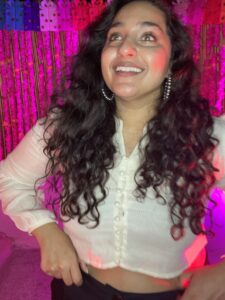
Q: How do you keep yourself and your content so relatable?
S: I don’t like to feel icky when I’m doing something. Let’s say it’s branded work. I have delayed branded work more than once because I shot something and I looked at it and thought, ‘This is a disaster, I can’t put my name on it.’ Some of my best work, in terms of the most engagement, has been me just verbally vomiting that stuff out. Relatability is not a goal of mine but since having a conversation is one of my leading goals it does end up happening that way.
Q: You recently moved from Islamabad to Karachi, tell us a little bit about how you’ve settled in so far, what’s surprised you about Karachi.
S: Honestly it’s been one of the best decisions I’ve ever made, Alhamdulillah. Karachi has a billion problems and I’m not underplaying that and yes, it’s a tough city, but for me personally I’ve grown up quite a lot. To be able to move like this is not an opportunity a lot of Pakistani women or even men get and I’m very lucky.
It’s very alive, you meet so many people from different backgrounds. It’s important for people to look around and see people who haven’t grown up like you or talk like you and you get that in Karachi more than anywhere else in Pakistan.
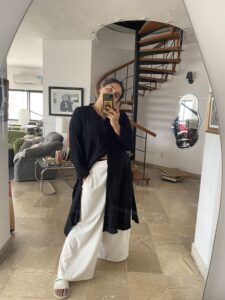
Q: Since we’re on the topic of Karachi I have to ask, what are your thoughts on a new coffee shop opening up on every corner recently? Have you jumped onto the craze?
S: I’m not even a coffee drinker and Karachi got me. They have some delicious coffee. And Karachiites are wild, they’ll go to coffee at 10pm. They’re not like us Islamabad people who cut off caffeine at 5pm. A lot of these shops are run by young people and it’s cool to see that. Will I be at a coffee shop past 6pm? Absolutely not! But I love seeing other people do it.
Q: Also in your opinion what’s the best city for food in Pakistan? Remember this one can get you a few haters.
S: Karachi, hands down. Not just in Pakistan, it is one of the best food cities in the world. Now when I come to Pindi or Islamabad, there’s nowhere I want to eat.
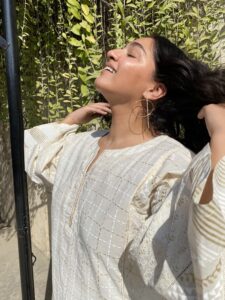
Q: Fashion and your fashion choices are a big part of your online persona. Why is showing this side of yourself, or exploring it for yourself so important to you?
S: I think being a bigger bodied person my entire life, clothing and access to it was limited to me and so clothes are a way for me to express femininity and express myself. I have quite an androgynous style and even in that I feel quite feminine. In Pakistan we need to go by social norms and social code, not just for respect but to be safe. I’ve felt de-sexualised and de-feminised and so having an outfit where I look cute is a way of me reclaiming that. For me it’s given me so much happiness and confidence
I also want to show other bigger bodied people you have options. There isn’t one way to be a big body in fashion, and I wish my body type wasn’t such a big deal, because I just look like a normal person.
I’m so much more about body neutrality now, honestly just wear a crop top and have a good time.
Q: What are your favorite inclusive Pakistani fashion brands? What makes fashion truly inclusive?
S: One brand I really love is Inclusivitee! They have a mission, they don’t put sizes on their clothes, and you get a fitting with them, but they’re also very respectful of their whole business.
I’ll be honest I’m friends with the siblings who own it but moving to Karachi was when I really got to see it for myself. I went over for a fitting and made some self-deprecating jokes and they didn’t play along.
I also have to give a shout out Khaadi. Not only do I find my sizes but I’ve modelled for them as well.
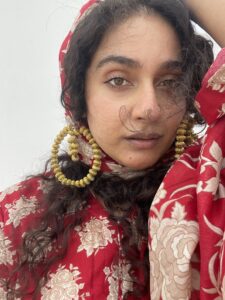
Q: You recently met Malala! What is she like? What did you get out the event with her, which I believe included a whole group of Pakistani women change makers?
S: Meeting Malala was amazing, it was such a pinch me moment. It actually came during a relative downward spiral so it was very invigorating and gave me confidence. She was so funny, and cool and I loved her humor. She is so receptive and warm, it was just like having a great conversation.
It was amazing to look around the room, see so many of my friends, so many women doing amazing things, content creators, artists, musicians, just awesome people. And I think for everyone in that room it was a really great moment and very affirming of the stuff we do having impact.
Q: What’s the best and worst part of being a funny Pakistani woman on the internet?
S: The best part of being a funny woman in Pakistan on the internet is all the jokes, getting to make people laugh. There’s so many funny people here. I’ve even used their jokes in my routines. It’s just an incredible way to meet people, and the internet is a great space to make funny and hone in on comedy writing.
The worst part – which as I’m older has gotten easier to deal with – but just the awful vitriol of nasty men and their supporters and that sort of thing. People threaten you, thinking they’re insulting you – but if you don’t respect a person, insulting you means nothing. But even then i can find some humor in that and I usually do.
Q: What’s your advice for Pakistani women who want to be themselves in this society?
S: The only thing I guess I could really say is you just have to be. But it depends on your situation, do you live on your own, what’s your family like, what’s your independent situation like because it is really easy for someone like me to just live your life but that’s not the case. It’s not always safe to be yourself.
So maybe it’s coming online even via an anonymous twitter or private instagram account and maybe you don’t even post but it’s just finding people you feel like yourself with.
And if you’re moving up the freedom scale sometimes you have to just kind of be. And this is what I’m learning in my life, sometimes the only thing you can do is just do.
Q: What would you like to be remembered for most?
S: I guess that I made you smile, I made you laugh. I hope people remembered that I cared, I really cared so much and I wanted you to laugh.
Q: What’s next for you?
S: I’m in a bit of a free flow moment right now where I’m figuring that out myself, what I enjoy doing, what I’m good at. But whatever it is I do in the future I just want to feel mentally healthy with whatever it is. I came off a pretty terrible mental health year directly correlated to the way i was earning money last year so I’m just learning what I want my life to look like and realistically how do I get there.
Answers have been condensed for length and clarity
Interview by: Anmol Irfan
Anmol is a Pakistani freelance journalist who works on issues related to social
justice, gender, and diversity with a focus on South Asia. She tweets @anmolirfan22



